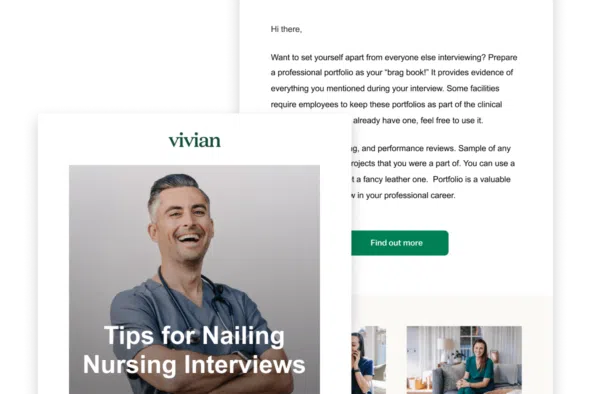In our continuing installment on common nursing interview questions, we pick up where we left off in How to Answer Common Nursing Interview Questions: Part 1. Prepare for your next nursing job interview with another round of common interview questions and advice on how to answer them. Practice these and the previous 10 questions to help ensure you won’t be stammering for an appropriate response and increase your odds of landing your dream job.
10 More Nursing Interview Questions and How to Answer Them
1. Give me an example of when you’ve been a team player.
The ability to work with other members of a patient’s healthcare team is crucial to providing the best care. This question aims to learn whether you work well with others and possess effective interpersonal and communication skills.
Before your nursing job interview, write down a few situations you can use for this and other similar questions regarding teamwork. Choose instances in which you and your coworkers worked well together, such as a rapid response, code or difficult patient.
Alternately, give an example of a time you acted as a resource for a coworker. Overall, the interviewer wants to hear when you put the patient’s, unit’s or hospital’s needs above your own to ensure the best outcome.
2. How do you prioritize your tasks and manage your time effectively?
Nurses know how hectic shifts can get. Often you must squeeze in more tasks than you have time, so effective time management is essential. Create a response demonstrating your organizational skills and ability to manage multiple responsibilities effectively.
Key points to include are your ability to assess the urgency of each task and prioritize tasks based on importance. Consider including details on goal setting, delegation, communication and coordination with other team members, utilizing technological resources to streamline workflow and setting realistic goals.
Ultimately, the interviewer wants to hear the strategies that enable you to complete tasks on time while delivering high-quality patient care.
3. Can you describe a situation where you made an error and how you handled it?
Nobody likes owning up to a mistake, especially one that might have caused a patient harm. However, errors may occur in fast-paced medical situations that are patient-heavy and light on resources. Your interviewer wants to know if you’ll supply an honest response.
Think of a specific incident in which you made an error but stick to a small mistake that could happen to any nurse. Outline your immediate response in acknowledging the error, taking full responsibility and the steps you took to correct the mistake and prevent something similar from happening in the future. It’s important to include what you learned from it and emphasize how you ensure you never make this same error again.
4. How do you handle stressful situations in the workplace?
Healthcare is one of the most stressful industries, so it’s crucial for nurses to have good stress management techniques. This question invariably comes up in various forms. The interviewer is primarily looking for three things with stress-related questions. They want to know that you:
- Fully understand and acknowledge the stress that nursing entails.
- Realize how stress affects you personally and have developed techniques that help you manage your stress.
- Have the ability to rise above it to deal with stressful situations successfully.
Describe a stressful situation you’ve faced in your nursing career, then explain how you successfully dealt with the situation and the stress. Remember to emphasize how well you perform under pressure and always prioritize patient care.
You can include proactive strategies, such as being well-prepared and organized, so you feel more confident when facing stressful situations. Don’t forget to add personal approaches to stress management, such as deep breathing or meditation, seeking support from colleagues, journaling or whatever technique(s) you use to ensure work-related stress doesn’t lead to burnout.
RELATED: 3 Tips for How to Handle Nursing Burnout
5. How do you ensure patient safety in your practice?
Ensuring patient safety is the number one priority of every nurse, so interviewers usually bring up at least one question regarding how you safeguard your patients in your practice. Explain in detail the strategies you use to prioritize patient safety and consistently deliver high-quality care.
Things to touch on in your answer include your adherence to protocols, such as ongoing patient assessment and attention to detail, especially regarding medication management. Mention your stellar communication skills, including communicating with patients, their families and other healthcare team members. It’s also beneficial to bring up your active engagement in continuously learning the latest nursing techniques.
6. Provide an example of a time you went above and beyond for a patient.
About a decade ago, the Hospital Consumer Assessment of Healthcare Providers and Systems patient satisfaction scores began playing a pivotal role in hospital reimbursements through the Hospital Value-Based Purchasing Program. Thus, patient satisfaction became the driving force behind how and how much hospitals are paid, not only by hindering their reputation but also by limiting their Medicare funding.
Being on the frontlines of patient care, nurses have the biggest opportunity to impact patient satisfaction. Therefore, an interviewer asking this question wants to hear that you’re a patient satisfaction champion. It also provides another opportunity for you to emphasize your dedication to making sure your patients receive the best possible care.
Share a specific situation in which you went the extra mile to ensure a patient’s safety, comfort or overall well-being, even if it didn’t directly relate to their care. Any time you’ve advocated for a patient, took the time to sit with a patient and their family to calmly explain something they didn’t understand or gone above and beyond in any fashion translates to a great example of how you’ve personally impacted patient safety.
7. Are you willing to learn?
This question should be one of the easiest to answer and always begin with a resounding yes! If you answer no, then pretty much nothing else you say will make a difference in your interview because the unspoken part of this question is, “Are you willing to learn to do things the way we do them at this facility?” The answer better be yes, or you’re wasting your time interviewing for this role.
During your answer, you want to illustrate ways you’ve sought out learning in the past. However, you also want to indicate your willingness to adapt to their facility. So, give examples of when you grasped new information quickly and immediately put it into practice. You not only want to show that you’re willing to adopt their ways but that you’re also looking forward to learning from your new colleagues and excited about the opportunity to grow and evolve as a nurse at their facility.
8. Are you able to make quick decisions?
This question may not come up if you’re in a slower-paced specialty, such as public health or school nursing. However, it likely will if the role is for a fast-paced unit, such as the emergency department or medical-surgical unit. Basically, the interviewer wants to know if you can think quickly on your feet and make sound decisions even if you’ve stepped out of your comfort zone.
You want to stress that you’re confident in your ability to make correct decisions quickly. Describe how your nursing training and experience have prepared you with strong critical thinking skills that enable you to rapidly assess situations, gather relevant information, weigh the available options and positively determine the ideal resolution. Explain that you understand the importance of making timely decisions in urgent situations and that you’re entirely comfortable taking decisive action while always maintaining patient safety.
9. Why are you leaving your current position?
This question is almost guaranteed and sometimes difficult to answer honestly without saying something negative about a former coworker, supervisor or facility. Remember, you always want to focus on what you do well without putting others down. Also, the interviewer doesn’t want to hear anything negative about a former manager or facility, leading them to believe you’ll be difficult to work with or complain about everything to anyone who’ll listen.
Good ways to answer this question include that you want to explore new opportunities that enhance your professional growth or strengthen your practice at a well-respected facility (a little flattery could go a long way, but don’t lay it on too thick). You can even begin by expressing your gratitude for your former employer and the experience you gained in that position, then follow that up with your desire to tackle new challenges, expand your skill set and explore the potential for career growth and advancement in this new role.
10. What are your future goals?
Interviewers frequently ask this question as a follow-up to the previous one. Asking you about your future goals helps them determine how long you plan on staying and if you have ambitions of moving up the ladder, preferably on their staff. This question presents an excellent time to discuss your plans to pursue an advanced degree or obtain additional professional certifications related to your field.
You don’t have to be currently enrolled in school or actively pursuing certification to prove you plan to further your career. You’re simply stating your future goals to establish your ambition to grow your nursing career. Anything you say that demonstrates a commitment to professional growth can be considered a positive response.
To be fully prepared for your nursing interview questions, really think about how you want to respond to the examples in this and the Common Nursing Interview Questions: Part 1 post. Remember to include specific examples from your nursing experience that correlate to the question, then practice positively presenting your answers. Don’t forget to tailor your responses to highlight your strengths while aligning them to the specific role you’re applying for and the healthcare facility’s values.
Take your job search to the next level with help from Vivian Health. Become a Vivian VIP to get priority access to new jobs that meet your criteria, earn bonuses along the way and more.






